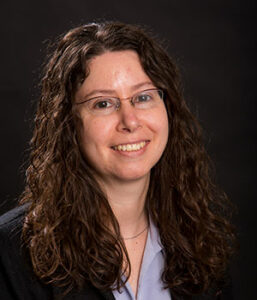Educational Psychology: Educational Statistics and Measurement PhD
Student learning is measured more than ever before, and that means that the education field needs professionals who have expertise in educational statistics and measurement.
Program Type
Doctoral
Program Format
On Campus
Why Choose Our PhD Program?
You’ll learn about:
- Standards and procedures for the development and use of psychological tests and measures.
- Procedures for collecting and analyzing test data including classical test theory, generalizability theory, item response theory, skills diagnosis and computer adaptive testing.
- Procedures to develop and/or apply quantitative methods and advanced statistical models to educational data.
- Advanced descriptive and inferential statistical techniques, including both traditional methods such as MANOVA and the general linear model and more modern methods such as structural equation modeling, longitudinal data analysis and categorical data analysis.
- Procedures to optimally design research studies in the social sciences, with a particular emphasis on issues related to urban educational research.
I’m glad that there was a heavy emphasis on really understanding the core fundamentals of all the statistical and psychometric models we commonly use. It is quite easy to jump into using complex models, but knowing the basics are so important for interpreting the results.

UWM’s Department of Educational Psychology offers a doctoral program for students who are interested in specializing in Educational Statistics and Measurement.
The Educational Statistics and Measurement PhD program is designed to provide you with the knowledge and experience necessary to research existing analytical techniques, as well as to develop and apply new methodologies in educational measurement and statistics. After completing your doctoral studies, you’ll be ready to independently conduct research, construct measurement instruments, translate sophisticated research findings, replicate research studies, contribute to the theory of research methodology and teach basic courses in measurement, statistics, and research design.
Program Handbook
The Educational Statistics and Measurement PhD Handbook (PDF) contains program information, sample course sequences, information on dual concentrations, full- and part-time plans and other general information about the program.
Career
You’ll find our graduates working in universities, state and federal agencies, test publishing organizations, school systems, state departments of education, marketing research companies and research centers, among other settings.
The Educational Statistics and Measurement PhD program prepares students for upper-level professional positions in the fields of educational measurement, evaluation and statistical methods. Such positions are generally found in colleges and universities, state and federal agencies, large public and private school systems, test publishing firms, and research and evaluation centers.
Our graduates have gone on to work as university professors, at testing centers, and at Cooperative Educational Service Agencies in Wisconsin.
The Graduate School provides a range of resources for student professional development on its website.
Program Requirements
Educational Statistics and Measurement PhD students are required to take a minimum of 54 credits. Of these, 12 are psychological foundations credits, three are urban foundations credits, 8-12 are credits in a minor outside the area or department, and the remaining 27-31 credits are from the research methodology area. These are the minimum credit requirements, but students often exceed the minimum in a typical program of study. For further details, refer to the Educational Statistics and Measurement PhD Handbook located under the About tab.
Doctoral students are then required to take a preliminary examination, which measures each student’s mastery of coursework and relevant subject matter and indicates whether you are qualified to proceed with dissertation planning.
The final step of the program is a dissertation. The dissertation is a formal opportunity to complete independent scholarly research and demonstrate that you have mastered the tools of independent research.
Students are also encouraged to get involved in research with faculty. Because the current student/professor ratio is low (2:1), there is ample opportunity for students to participate in research.
Doctoral Minor
Doctoral students from other programs can also add a minor in Educational Statistics and Measurement. If you take nine credits of courses in the ESM area, in addition to any courses that are required by your degree program, then a minor in ESM will be noted on your transcript. A minor in ESM will strengthen your quantitative research skills, which are valued by many employers.
Course Rotation
The Course Rotation Schedule (PDF) is intended to help you and your advisor plan your coursework schedule. Please consult the latest Graduate School Bulletin for course descriptions.
Application Process
All application materials must be submitted through UWM Graduate School’s Panthera Application System.
Please pay close attention to the Educational Statistics and Measurement PhD preferred deadlines.
- Final Deadline for Spring Admission: Final application deadline is Oct. 1 for Spring admission.
- Priority Deadline for Fall Admission: For applicants who wish to be considered for available types of financial assistance available on campus, we recommend completed applications by Dec. 1 for admission the following Fall.
- Final Deadline for Fall Admission: Final application deadline is Feb. 15 for Fall admission.
The program may consider applications submitted after these deadlines on a case by case basis, though we suggest you apply as early as possible. UWM’s Graduate School recommends students apply one year before they intend to start.
Note: The program requires three letters of recommendation. These letters must be submitted through the application’s electronic recommendation feature by the recommenders themselves. Letters uploaded or sent by the applicant will not be accepted.
Educational Statistics and Measurement faculty have expertise in educational measurement topics such as item response theory, differential item functioning, and educational assessment, as well as in educational statistics topics such as general linear models including multiple regression, structural equation models and hierarchical linear models.
Faculty
- Professor, Educational Psychology
- Director, Consulting Office for Research & Evaluation
- Director, Educational Statistics and Measurement MS/PhD
- azen@uwm.edu
- Enderis Hall 771
PhD Students
- PhD Student, Educational Psychology: Educational Statistics and Measurement
- PhD Student, Educational Psychology: Educational Statistics and Measurement
- PhD Student, Educational Psychology: Educational Statistics and Measurement






